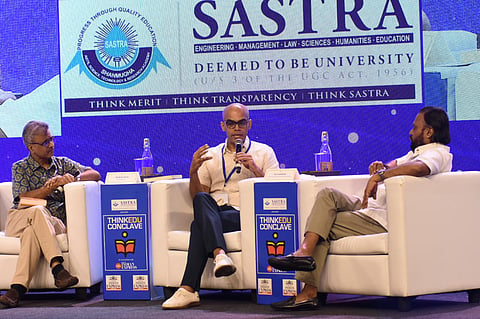

CHENNAI: The ThinkEdu Conclave 2024, presented by SASTRA University, in Chennai on Thursday, witnessed a thought-provoking discussion on the North-South cultural distinctions within India, where AR Venkatachalapathy, historian and author, emphasised the inclusive nature of growth in South India.
During the session titled “The South Story: A New Narrative”, Venkatachalapathy highlighted historical instances, such as the Vijayanagara Empire, where there were Muslim soldiers and the emperor embraced the robe of a sultan, illustrating a marked difference between the northern and southern regions.
Addressing the controversy surrounding Hindi imposition, data scientist Nilakantan RS drew parallels with similar language-related issues in other parts of the world, emphasising that people are against imposition.
Venkatachalapathy delved into the role of religion in politics, particularly the bhakti movement in South India, which he described as profoundly liberating.
“It could vocalise the sentiments of all classes of people, using a language accessible to the masses, devoid of ritualistic complexities. The devotional literature of the south accentuates a direct relationship with God, emphasising personal connection rather than reliance on the mediation of the priestly class,” articulated Venkatachalapathy.
Unlike the North, he emphasized that temples in the South serve as social institutions, playing a leveling role despite existing hierarchical structures. “Temples in Tamil Nadu constitute a distinct and multifaceted institution, encompassing social, cultural, and economic dimensions for over 800 to 900 years. This enduring nature is evident in the ongoing social conflicts, wherein disputes over temple rights serve as a manifestation of their integral role in the community,” elaborated Venkatachalapathy.
Nilakantan added that states with high sub-nationalism, like Tamil Nadu and Kerala, show lower use of religion in politics.
Exploring cultural differences in cinema, Venkatachalapathy pointed out that South Indian films are more rooted, reflecting the region's linguistic boundedness.
“The film industry's nature varies significantly between the North and South. Bollywood, aiming to capture a vast market, tends to be rootless, with many stories set in foreign locales over the last few decades. In contrast, South Indian cinema remains grounded, rooted in its regional context. This linguistic boundedness, while limiting its market, also serves as a strength. Attempts to break away from this model encounter the same challenge,” explained Venkatachalapathy.
He further elaborated stating that in movies, it’s often observed that men are portrayed as ordinary while women are depicted as enchanting.
“This difference is rooted in the evolving social composition of South Indian cultural elites over the last 40 or 50 years. Historically, a South Indian in Delhi, fluent in English, would be mistakenly assumed to be a Brahmin. Earlier, newspapers predominantly quoted figures like Cho Ramasamy. However, in recent years, there has been a broadening of the South Indian intellectual landscape, and this transformation is mirrored in cinema,” he elaborated.
Venkatachalapathy attributed the inclusive nature of South India to historical maritime relations and openness to diverse cultures. Responding to a question about the North-South disparity, Nilakantan asserted that it is not the failure of South Indian politicians but a structural issue in the Indian Union, allowing the dominant focus on the Indo-Gangetic plains while sidelining South India.